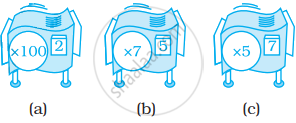Advertisements
Advertisements
प्रश्न
The table shows the mass of the planets, the sun and the moon in our solar system.
| Celestial Body |
Mass (kg) | Mass (kg) Standard Notation |
| Sun | 1,990,000,000,000,000,000,000,000,000,000 | 1.99 × 1030 |
| Mercury | 330,000,000,000,000,000,000,000 | |
| Venus | 4,870,000,000,000,000,000,000,000 | |
| Earth | 5,970,000,000,000,000,000,000,000 | |
| Mars | 642,000,000,000,000,000,000,000,000,000 | |
| Jupiter | 1,900,000,000,000,000,000,000,000,000 | |
| Saturn | 568,000,000,000,000,000,000,000,000 | |
| Uranus | 86,800,000,000,000,000,000,000,000 | |
| Neptune | 102,000,000,000,000,000,000,000,000 | |
| Pluto | 12,700,000,000,000,000,000,000 | |
| Moon | 73,500,000,000,000,000,000,000 |
- Write the mass of each planet and the Moon in scientific notation.
- Order the planets and the moon by mass, from least to greatest.
- Which planet has about the same mass as earth?
उत्तर
a. Mass of each planet and Moon in scientific notation is given below:
Using law of exponents, am × an = am + n
Sun = 199 × 1028
= 1.99 × 1028 × 102
= 1.99 × 1030
Mercury = 33 × 1022
= 3.3 × 1022 × 10
= 3.3 × 1023
Venus = 487 × 1022
= 4.87 × 1022 × 102
= 4.87 × 1024
Earth = 597 × 1022
= 5.97 × 1022 × 102
= 5.97 × 1024
Mars = 642 × 1027
= 6.42 × 1027 × 102
= 6.42 × 1029
Jupiter = 19 × 1026
= 1.9 × 1026 × 10
= 1.9 × 1027
Saturn = 568 × 1024
= 5.68 × 1024 × 102
= 5.68 × 1026
Uranus = 868 × 1023
= 8.68 × 1023 × 102
= 8.68 × 1025
Neptune = 102 × 1024
= 1.02 × 1024 × 102
= 1.02 × 1026
Pluto = 127 × 1020
= 1.27 × 1020 × 102
= 1.27 × 1022
Moon = 795 × 1020
= 7.95 × 1020 × 102
= 7.95 × 1022
b. Order of mass of all planets and Moon from least to greatest
Pluto < Moon < Mercury < Venus < Earth < Uranus < Neptune < Saturn < Jupiter < Mars
c. Venus has about the same mass as Earth.
APPEARS IN
संबंधित प्रश्न
The diameter of the Sun is 1.4 × 109 m and the diameter of the Earth is 1.2756 × 107 m.
Two machines can be hooked together. When something is sent through this hook up, the output from the first machine becomes the input for the second. Which stretching machine does the same work as two (× 2) machines hooked together?
  |
For the following repeater machines, how many times the base machine is applied and how much the total stretch is?

What will the following machine do to a 2 cm long piece of chalk?

Sanchay put a 1 cm stick of gum through a (1 × 3–2) machine. How long was the stick when it came out?
Ajay had a 1 cm piece of gum. He put it through repeater machine given below and it came out `1/(100,000)` cm long. What is the missing value?

Shikha has an order from a golf course designer to put palm trees through a (× 23) machine and then through a (× 33) machine. She thinks she can do the job with a single repeater machine. What single repeater machine should she use?

Find three machines that can be replaced with hook-ups of (× 5) machines.
The left column of the chart lists the lengths of input pieces of ribbon. Stretching machines are listed across the top. The other entries are the outputs for sending the input ribbon from that row through the machine from that column. Copy and complete the chart.
| Input Length | Machine | |||
| × 2 | ||||
| 1 | 5 | |||
| 3 | 15 | |||
| 14 | 7 | |||
A particular star is at a distance of about 8.1 × 1013 km from the Earth. Assuring that light travels at 3 × 108 m per second, find how long does light takes from that star to reach the Earth.
